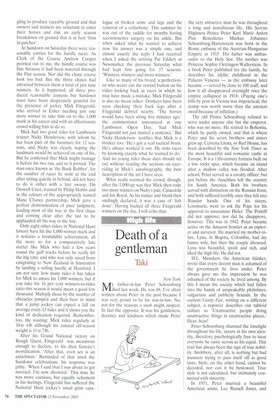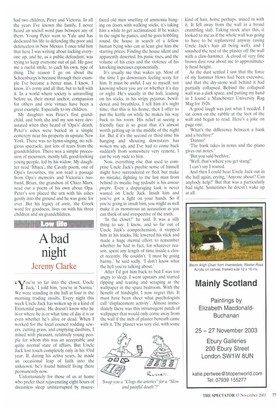Death of a gentleman
Taki
New York
My father-in-law Peter Schoenburg died last week. He was 88. I've often written about Peter in the past because I was very proud to be his son-in-law. No, not for the reasons a snob might suspect. In fact the opposite. It was his gentleness, decency and kindness which made Peter
the very attractive man he was throughout a long and tumultuous life. His Serene Highness Prince Peter Karl Marie Anton Pius Benedictus Markus Johannes Schoenburg-Hartenstein was born in the Rome embassy of the Austrian-Hungarian Empire in 1915. His father was ambassador to the Holy See. His mother was Princess Sophie Oettingen-Wallerstein. In a book Peter published for the family, he describes his idyllic childhood in the Palazzo Venezia — as the embassy later became — served by close to 100 staff, and how it all disappeared overnight once the empire collapsed in 1918. (Paying one's bills by post in Vienna was impractical; the stamp was worth more than the amount owed because of inflation.) The old Prince Schoenburg refused to serve under anyone else but the emperor, who was no more. He retired to Bohemia, which he partly owned, and that is where Peter and his seven brothers and sisters grew up. Cervena Lhota, or Red House, has been described by the New York Times as the most beautiful and romantic castle in Europe. It is a 13th-century fortress built on a low rocky spur, which became an island after a shallow valley was flooded. After school, Peter served as a cavalry officer, but just before the Anschluss left the country for South America. Both his brothers served with distinction on the Russian front, and both suffered terribly once they fell into Russian hands. One of his sisters, Loremarie, went to ask the Pope for his approval to assassinate Hitler. The Pontiff did not approve; nor did he disapprove, however. This was in 1942. Peter became active on the Amazon frontier as an explorer and surveyor. He married my mother-inlaw, Lyna, in Bogota, Colombia, had my future wife, but then the couple divorced. Lyna was beautiful, spoilt and rich, and liked the high life. He did not.
H.L. Mencken, the American thinker, wrote that every decent man is ashamed of the government he lives under. Peter always gave me the impression he was ashamed of the society he lived among. By this I mean the society which had fallen into the hands of unspeakable philistines, vulgarians and publicity hounds. In the current Vanity Fair, writing on a different subject, a reporter describes our tabloid culture as 'Unattractive people doing unattractive things in unattractive places.' Hear, hear!
Peter Schoenburg shunned the limelight throughout his life, secure in his own identity, therefore psychologically free to treat everyone he came across as his equal. This trait has always been the sign of true nobility. Snobbery, after all, is nothing but bad manners trying to pass itself off as good taste. Style, on the other hand, cannot be decoded, nor can it be bestowed. True style is not calculated, but intimately connected with sincerity.
In 1951, Peter married a beautiful American aristo, Lee Russell Jones, and had two children, Peter and Victoria. In all the years I've known the family, I never heard an uncivil word pass between any of them. Young Peter went to Yale and has dedicated his life to defending the poor and defenceless in New Mexico. I once told him that here I was writing about locking everyone up, and he, as a public defendant, was trying to keep everyone out of jail. He gave me a rueful smile, to each his own, type of thing. The reason I go on about the Schoenburgs is because through their example I've become a better man. I know, I know, it's corny and all that, but to hell with it. In a world where society is unravelling before us, their moral anchor, compassion for others and civic virtues have been a great example. Especially to my children.
My daughter was Peter's first grandchild, and both she and my son were devastated when they heard of `Opa's' death. Peter's ashes were buried in a simple cemetery near his property in upstate New York. There was no hymn-singing, no religious spectacle, just lots of tears from the grandchildren. There was a simple procession of mourners, mostly tall, good-looking young people, led by his widow. My daughter read 'Ithaca', the Cavafy poem, one of Opa's favourites, my son read a passage from Opa's memoirs and Victoria's husband, Brian, the grandson of Chico Marx, read out a poem of his own about Opa. Peter's son placed the urn with his ashes gently into the ground and he was gone for ever. But his legacy of arete, the Greek word for goodness, lives on with his three children and six grandchildren.



























































































 Previous page
Previous page